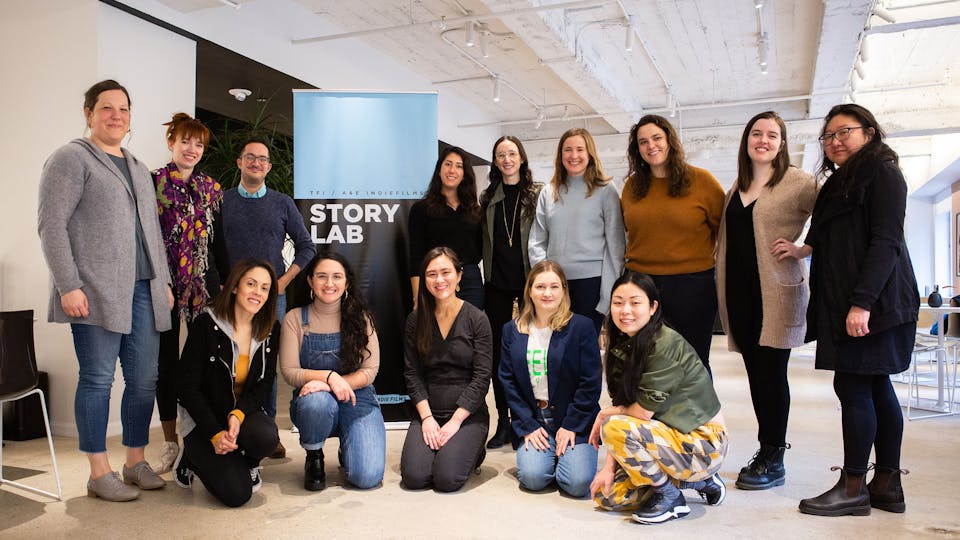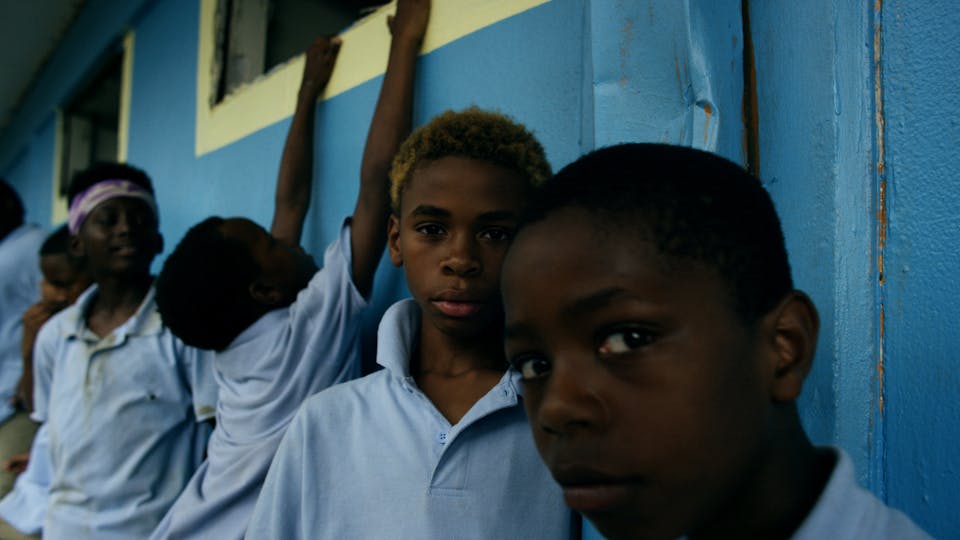Four Major Influences From Joanna Lipper

Premiering tomorrow at the Human Rights Watch Film Festival, Joanna Lipper's moving The Supreme Price (Gucci Tribeca Documentary Fund alum) explores the amazing story of Hafsat Abiola, daughter of Nigeria’s President M.K.O. Abiola who won a historic vote in 1993 only for him to be imprisoned and the victory annulled shortly after. Hafsat, about the graduate from Harvard, returns home to join her parents' struggle.
Here we asked Lipper to give us the main things that influenced the style of her film.
Reading: Poetry and Prose by Adrienne Rich

Adrienne Rich died in 2012 while I was making The Supreme Price. As I read obituary after obituary, I reflected deeply on how her work as a feminist poet, essayist and political activist had influenced my decision to become a filmmaker. Today I continue to contemplate the many ways in which her writing and the themes and questions she addressed over decades influenced my interest in making The Supreme Price, a documentary film that looks in depth at the ongoing struggle of women against patriarchal oppression, their fight for equal rights, and their use of their bodies as instruments of protest as they continue to pursue the elusive ideal of a genuine democracy where women’s voices can be equally heard, their needs addressed and their visions for their country fully articulated and realized.
Throughout my life, Adrienne Rich’s poems have made me think, question, expand my frames of reference, empathize and act—in the same way that a good documentary aspires to influence viewers. Her writing demonstrated how feminist politics and eloquent words that often evoked cinematic visual imagery could be intertwined into one lucid and cohesive work of art. In her poems, Adrienne Rich explored what it means to be a woman, an artist and an agent of change, absorbing the world then reflecting it back in one’s chosen medium.
In Planetarium, one of Adrienne Rich’s best-known poems, she illuminated 19th- century German astronomer Caroline Herschel, a pioneering woman who discovered eight comets and three nebulae. Rich argued that although Caroline Herschel’s brother, William, got most of the credit for her work during her lifetime, there is a clear way of reframing this old way of looking—or more accurately, of overlooking—women’s contributions and achievements. She closes her poem by evoking this image of herself as a poet and visionary—this image is indelibly etched in my mind and continues to resonate:
What we see, we see and seeing is changing...
I am bombarded yet I stand
I have been standing all my life in the direct path of a battery of signals the most accurately transmitted most untranslateable language in the universe I am a galactic cloud so deep so invo- luted that a light wave could take 15 years to travel through me And has
taken I am an instrument in the shape of a woman trying to translate pulsations into images for the relief of the body and the reconstruction of the mind.
Narrative Feature Films: The Last Emperor & Hiroshima, Mon Amour
There are a few great films that I watch over and over again month after month, year after year. I study them passionately with awe and wonder always discovering new moments, techniques, nuances and insights with each viewing. They influence how I approach watching films and making them and have shaped my sense of what I love most in cinema. Two of my absolute favorites in this category are The Last Emperor directed by Bernardo Bertolucci and Hiroshima, Mon Amour directed by Alain Resnais. I greatly admire the way those two films interweave past and present to situate individual characters against sweeping historical and global contexts at pivotal points of crisis, trauma, political upheaval and transition.

In The Last Emperor we are introduced to Pu Yi at Fushun Prison in 1950 where he is incarcerated as a political prisoner and war criminal. Through flashback, the film takes us back to 1908 when as a child he becomes emperor. The dramatic arc of his automatic power and extreme wealth as a very small child and his reversal of fortune as an adult when the People’s Republic of China was established and communism took root was portrayed by Bertolucci in stark, emotional, human terms. The humanity, vulnerability and loneliness in this great film’s characterization of a nation’s leader made me think in depth about M.K.O Abiola’s ascent to president-elect of Nigeria and his subsequent arrest and incarceration as a political prisoner. The scene in my film where Abiola is on the motorcade passing by huge crowds of cheering voters and the scene where the balloons with Abiola’s name on them rise up into the sky as Nathan Larson’s score builds towards this jubilant moment of hope are followed by a shot of Abiola raising his arms in victory. His triumphant mood is abruptly shattered by the military coup that strips him of his power and identity as a leader. The pacing of these moments and this particular sequence of events in my film reflect my understanding of the extreme vulnerability of individual leaders at moments of historical flux and political transition as demonstrated so profoundly in The Last Emperor.

Alain Resnais worked as a film editor and directed documentaries before going on to become one of the most gifted and innovative narrative filmmakers in the history of cinema. In Hiroshima, Mon Amour, I greatly admire the way in which Resnais (directing from a magnificent script by Marguerite Duras) combines archival footage, dramatic re- enactments in the form of the main character acting in a historical movie being filmed within the film while also appearing in present-day scenes and narrating flashbacks in voiceover to create a narrative that encompasses a variety of formats and viewpoints that come together to create a seamless experience for the audience that is at the same time deeply intimate and psychologically rooted in the present and also epic and historic. When I encountered challenges in the editing room setting out to tell the intergenerational story of the Abiola family's rise and fall unfolding against the historical backdrop of Nigeria’s evolution from independence in 1960—through the Biafra War, subsequent military dictatorships, and the tumultuous transition to civilian rule—to present day, rather than tell the story of the Abiola family in a completely linear way, I went back and forth between past and present relying on thematic and emotional points of transition between time frames.
Documentaries: Pray the Devil Back To Hell, Iron Ladies of Liberia, Bhutto
The Supreme Price illuminates the stories of Nigerian women activists in the pro- democracy movement. Kudirat Abiola is an example of the familiar global phenomenon of dynastic transfer of leadership through kinship ties. Her husband, President-elect M.K.O. Abiola, was arrested and jailed following a military coup and the installation of General Sani Abacha. While Abiola was incarcerated Kudirat took over leadership of the opposition movement and fought tirelessly to restore her husband’s mandate. She organized rallies and the oil workers’ union strike, calling for international sanctions against Nigeria and making her own unique contributions as a leader in the fight against the injustice and human rights violations of Abacha’s military dictatorship. While preparing to make The Supreme Price, I studied examples of how the subject of women’s leadership had been portrayed in three documentaries: Pray The Devil Back to Hell, Iron Ladies of Liberia and Bhutto. As a Lecturer at Harvard, I teach Using Film For Social Change and every year I include these films as part of a unit on Women in Politics in part because each one illustrates a very different dimension of women’s leadership.
Pray The Devil Back to Hell explores how activist Leymah Gbowee mobilized Christian and Muslim women at the grassroots level to form the Women of Liberia Mass Action for Peace Movement. They succeeded in driving corrupt dictator Charles Taylor into exile and opening up the possibility for the election of Africa’s first head of state, Ellen Johnson Sirleaf. Iron Ladies of Liberia focuses on Ellen Johnson Sirleaf and portrays her public and private experiences during her first year as President of Liberia, exploring the complexities of her role as a woman in an executive leadership position at the highest level in a country emerging from the ravages of a brutal civil war. Not long after these documentaries were released and viewed internationally, Leymah Gbowee and Ellen Johnson Sirleaf won the Nobel Prize.
Bhutto looks at the evolution of a family dynasty and the tumultuous transition of power from Pakistan’s first democratically elected President, Zulfikar Ali Bhutto, who was executed, to his daughter, Benazir Bhutto who made history by becoming the first woman elected to lead an Islamic country. The opening of this film uses graphics, maps, statistics and archival footage extremely efficiently to condense key facts about Pakistan that contextualize the story of the Bhutto family.
These three films were very useful to watch as I made decisions about how to approach the topics of women’s political leadership, human rights activism and the use of maps and graphics to convey national histories and cultures in The Supreme Price.
Ideas: Women’s Empowerment is a Security Issue
In her TEDWomen Speech in 2010, Secretary of State Hillary Clinton stated, “The United States has made empowering women and girls a cornerstone of our foreign policy because women’s equality is not just a moral issue, it’s not just a humanitarian issue, it is a prosperity issue, and it is a peace issue...in the vital interest of the United States of America... Give women equal rights and entire nations are more stable and secure. Deny women equal rights and the instability of nations is almost certain.... The subjugation of our women is, therefore a threat to the common security of our world and the national security of our country.”

The vast empirical data validating this perspective appears convincingly and in depth in the book Sex and World Peace by Valerie Hudson and her co-authors.
In 1997, Hillary Clinton founded the Vital Voices Democracy Initiative, which has evolved into an NGO dedicated to women’s security, political participation, leadership, education and social and economic empowerment. Vital Voices has influenced my thinking regarding how to go about maximizing impact and outreach possibilities for The Supreme Price. Audiences who come away from the film wanting to take concrete action to make a difference in the lives of women and girls in Nigeria can do so by contributing directly to Vital Voices Global Partnership, and its many influential initiatives that mentor, support and advocate for women’s leadership.
Vital Voices will be presenting The Supreme Price at AFI Docs Film Festival on June 20th. I will participate in a Q&A with Hafsat Abiola, and moderator, Alyse Nelson, President and CEO of Vital Voices.






